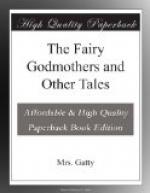He did not thoroughly understand what the Genie said, but he was convinced that something had been done towards making him like to the young King. As he was dawdling home, his eye was struck by the sight of a beautiful because picturesque dark fishing-boat, which he saw very plainly, because the red sun was setting behind it. Joachim felt a strange wish to make something like it; and, taking up a bit of white chalk he saw at his feet, he drew a picture of the boat on the tarred side of another that was near him. While he was so engaged, an old fisherman came up very angrily. He thought the child was disfiguring his boat; but, to his surprise, he saw that the little fellow’s drawing was so capital, he wished he could do as much himself.
“Why, who taught you to do that, young Master?” said he.
Joachim was no great talker at any time, and he now merely said, “Nobody,” and smiled.
“Well, you must draw my boat some day, for me to hang up; and now here’s a luck penny for you, for you certainly are a capital hand for such a youngster.”
Joachim was greatly pleased with the penny, for it was a curious old one, with a hole through it; and he told his Mother all about it; but though it may seem strange, he never mentioned the bottle and the Genie to her at all. That appeared to him to be a quite private affair of his own.
He altered very much, however, by degrees. He had been till then rather a dull, silent boy: now he talked much more, was more amusing, was always endeavouring to draw, and after being at church would try to read the prayers like the parson. His Mother was delighted. She began to think her son would grow up a good scholar after all, and being now well off, owing to the King’s kindness, she resolved on sending little Joachim to school.
To school, accordingly, he went; and here, my little readers, there was a great change for him. Hitherto he had lived very much alone with his Mother, and being quiet, and somewhat dull by nature, he had never till quite lately had many acquaintances of his own age.
Now, however, he found himself among great numbers of youths, of all ages, and all characters. At first he was shy and observant, but this soon wore off, and he became a favourite. Nobody was more liked at any time, and he was completely unrivalled in the play-ground. He could set all the boys in a roar of laughter, when, hid behind a bush, he would bark so like a dog that the unhappy wights who were not in the secret expected to see a vicious hound spring out upon them, and took to their heels in fright. He was first in every attempt at acting, which the boys got up; and there was not a cat nor a pig in the neighbourhood whose mew and squeak he could not give with the utmost exactness. If you ask how he got on at lessons, I must say—well, but not very well. His powers of entertaining his companions were so great, that I fear he found their easily-acquired praise more tempting than the rewards of laborious learning. He could learn easily enough, it is true; but while his steadier neighbours were working hard, he was devising some new scheme for fun when lessons should be over, or making some odd drawing on his slate to induce his companions to an outburst of laughter.




